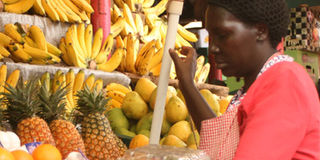Inflation declines as food prices fall

Reduction in annual food inflation is attributed to increased food supply in the market.
What you need to know:
Reason. Ubos says the reduction in annual food inflation is attributed to increased food supply in the market during the harvesting season
KAMPALA.
A reduction in annual food inflation of 1.8 per cent has helped Uganda to register a decline in its prices of foodstuff.
Uganda Bureau of Statistics (Ubos) said in its latest Consumer Price Index (CPI) for August that the annual headline inflation for the year ending August 2015, declined to 4.8 per cent compared to 5.4 per cent registered for the previous year.
Ubos says the reduction in annual food inflation is attributed to increased food supply in the market in the harvesting season, which has led to a fall in food crop prices. This implies that the public’s expenditure on food item has been relatively low.
“High food prices are always the main driver of the annual headline because it has a big weight of 27 per cent in the Consumer Price Index,” said the Ubos director for macroeconomics, Dr Christ N. Mukiza.
Dr Mukiza said the other source of decline in Uganda’s annual headline was as a result of reduction in annual Energy, Fuel and Utilities (EFU) inflation which decelerated to 3.9 per cent in August 2015 compared to 6.0 per cent in July 2015.
The annual core inflation which excludes food crop items, fuel and metered water from the CPI, however, increased to 5.5 per cent for the year ending August 2015, compared to 5.4 registered in July 2015.
Dr Mukiza said: “The rise in annual core inflation has been caused by the exchange rate depreciation, which has continued to see the Uganda Shilling deprecating against the US dollar. The other cause is high meal prices in restaurants, clothing and footwear.”
In an interview with Daily Monitor yesterday, the managing director of Alpha Capital, Mr Stem Kaboyo, said what Ubos data shows is that August inflation remained subdued primarily on account of lower food prices. “While this one-off is good news for the economy, and could have important implications for the conduct of monetary policy, we are not yet out of the woods,” Mr Kaboyo said.
He added there is still concern that the depreciation of the Shilling could degenerate into an inflation spiral in the coming months, once the effects of the weak Shilling that come with the lag begin passing through. Bank of Uganda uses the core inflation rate to control Uganda’s inflation at 5 per cent
Ubos figures
The Ubos figures show that food registered an annual inflation of 5.1 per cent for the year ending August 2015 compared to the 6.8 per cent recorded during the year ended July 2015. On the other hand, the annual non-food inflation also decelerated to 4.7 per cent for the year ending August 2015 compared to the 5.1 per cent recorded for the year ended July 2015.




